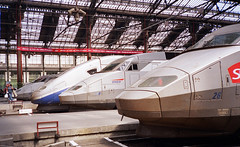
TGVs
Originally uploaded by seadipper.
I went into the French Railways shop in Piccadilly to buy tickets for a journey next month. I was told to book by telephone as there was a two hour queue, even though there only seemed to be a few people waiting and there were several staff selling the tickets. But considering that it usually takes 20 minutes to buy a train ticket there, the wait was less surprising.
Why has buying train tickets become so complicated?
The root of the problem seems to be something called "Yield Management", which is about getting as many seats as possible occupied to maximise the load factor. This is a perfectly reasonable thing to do, as it not sensible to run half-empty trains. There is nothing new about it. Almost since the begining of railways there have been cheap fares for travel at less popular times. But things changed about thirty years ago. Before that, railways used to keep a reserve fleet which were used to carry the extra people who wanted to travel during the rush hour and in the holiday season. These were old vehicles which could be added to trains to provide extra seating, or for running extra trains.
But from the 1970s the fixed formation train - like the British Inter City 125 - became the vogue. Such trains cannot easily be lengthened to provide extra seating and so it became more important to match demand to supply by having different fares for travel at different times.
Making matters worse is the high cost of rolling stock, which is many times higher, in real terms than it was fifty years ago and continues to rise. A mark 1 coach cost around £6000 in the mid-1950s. The equivalent today will cost around £800,000, which, allowing for an inflation factor of around 30, is over four times the price. Compare this to the price of a car, which has gone from around £600 to £12,000, a fall in real terms.
There are many reasons for this. There are few train manufacturers. Trains are not mass produced like cars. But perhaps the main issues are the complexity and inflexibility of modern trains, together with the tendency to have self-powered trains instead of individual locomotives.
However, the problem is compounded by the booking systems in use and the practice of booking each passenger into a particular seat. Some systems seem unable to allocate the same seat to different passengers travelling on different legs of the journey, and report that a train is full when it is not. I came across this on the Bergen to Oslo line, when a supposedly fully booked train was never more than one-third full, and again on a Stockholm to Malmö service when a passenger was advised to get on the "fully booked" train and just move from one empty seat to another if anyone turned up to claim their booked seat.
In any case, the whole exercise of booking passengers into particular seats can be counter productive for the passengers. Many so-called "window seats" are nothing of the kind but give their occupants a fine view of a plastic panel or piece of curtain. Finding such a seat not to their liking, the passengers then go and sit somewhere else until the passenger who has reserved that seat turns up, when they move. The Hamburg to Köln express seems to run on that principle, with a game of musical chairs going on after every station stop. It isn't good, and moving seats is a way of losing one's belonging.
There are all sorts of issues entailed here, from the seating layouts inside the trains to the way that traffic is managed to match supply and demand.
If the aim is to get passengers to travel by train instead of by plane, it is something that needs to be looked at.
Kommentarer